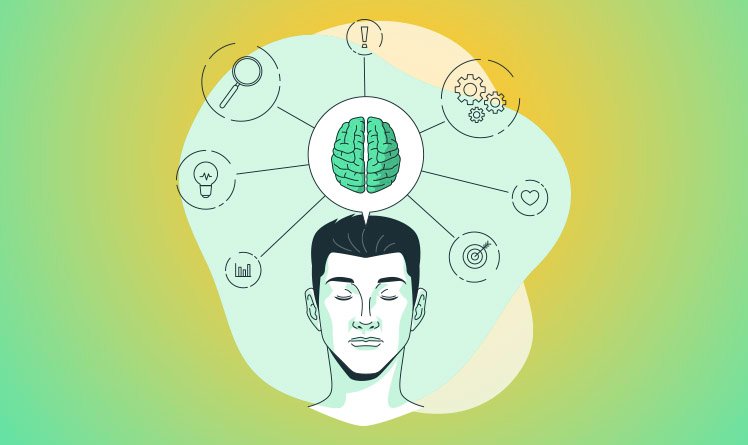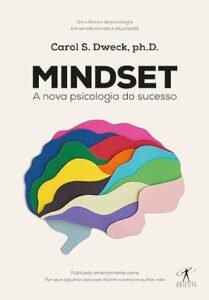Mindset: what it is and how to develop it

|
Getting your Trinity Audio player ready...
|
Amidst the whirlwind of modern life, where we are constantly bombarded with challenges and opportunities, a crucial question arises: what really determines our success and happiness? Innate talents? Luck? Destiny written in the stars? The answer lies in a fascinating and little-known concept: mindset.
In this article, we will understand the concept of mindset and know how to develop it to increase our internal capabilities.
What is it mindset?
But what is it? mindset, after all? Imagine your mind as a garden. The mindset, in turn, represents the fertile or arid soil where your seeds of dreams and goals flourish or wither. In this way, it defines your beliefs about yourself, your abilities and your potential, shaping the way you face challenges, pursue your goals and interpret life experiences
THE mindset is a term widely discussed in the fields of positive psychology and personal development. Simply put, it refers to the way you think and interpret the world around you. It is your mindset, your set of beliefs and attitudes that shape your actions and reactions.
The origin of the concept of mindset
The concept of mindset gained popularity thanks to psychologist Carol Dweck, author of the book “Mindset: The New Psychology of Success“. Dweck identified two main types of mindset that influence how people deal with challenges and adversities: mindset fixed and the mindset of growth.
The two types of mindset
People with mindset Fixed individuals believe that their abilities and intelligence are innate and unchangeable. When faced with challenges, they tend to give up easily, feeling unmotivated and unable to overcome obstacles. On the other hand, individuals with mindset of growth They see their skills as something that can be developed and improved with effort and dedication. Thus, they see challenges as learning opportunities, persisting even in the face of failure and learning from each mistake. Let's look at some details about each of these ways of thinking and acting.
Mindset fixed: beliefs that prevent evolution
THE mindset Fixed mindset is the belief that abilities, intelligence, and talents are innate and unchangeable characteristics. Thus, people with this type of mindset tend to believe that their natural attributes determine their success and that little can be done to change this.
In this type of mindset Mistakes are seen as a reflection of individual intelligence and ability, leading to fear of exposing oneself and trying new things. Self-esteem depends on the approval and praise of others, weakening self-confidence and resilience. Likewise, comparison with others becomes constant, generating envy, frustration and demotivation.
Furthermore, they have difficulty dealing with criticism and often give up easily when faced with obstacles, as they fear failing and appearing incapable. Effort is seen as futile, since, from this perspective, abilities are fixed. This type of mindset can limit personal and professional growth, as it inhibits the search for new skills and adaptation to new situations.
In short, the mindset fixed prevents a person from exploring their full potential, keeping them within the self-imposed limits of their perceived abilities.
Impacts of mindset fixed: obstacles on the path to success
The limiting beliefs of mindset fixed generate several negative impacts on people's lives:
- Lower academic performance: Difficulties in learning, lack of motivation to study and low self-esteem in relation to learning.
- Stagnation in professional career: Lack of initiative to seek new opportunities, fear of taking on challenges and difficulty in dealing with criticism and feedbacks.
- Relationship problems: Difficulty dealing with conflicts, lack of empathy and a tendency to blame others for problems.
- Low self-esteem and well-being: Feeling of inadequacy, pessimism and difficulty in dealing with life's frustrations and challenges.
Mindset of growth: embracing infinite potential
On the other hand, the mindset Growth mindset is the belief that skills and intelligence can be developed through dedication and hard work. People with this type of mindset see challenges as learning opportunities, persist in the face of difficulties, and value the process of effort and continuous improvement.
Thus, a growth mindset opens the doors to a world of possibilities and allows you to reach your full potential. Here are some characteristics:
- Love of learning: Learning and developing are challenging and rewarding processes.
- Challenges as opportunities: Difficulties are seen as opportunities to learn, grow and overcome.
- Effort and persistence: Effort is valued as the path to success. Persistence is essential to overcoming obstacles and achieving goals.
- Resilience: In the face of failure, resilience allows you to get up, learn from your mistakes and continue pursuing your goals.
- Opening to feedbacks: Reviews and feedbacks are opportunities for learning and growth.
Benefits of mindset of growth
THE mindset growth brings several benefits, bringing flowering for all areas of life:
- Superior academic performance: Greater motivation to study, better learning and greater ability to overcome academic challenges.
- Success in your professional career: Greater initiative to seek new opportunities, better performance at work and greater ability to deal with challenges and criticism.
- Healthier relationships: Greater empathy, effective communication and the ability to deal with conflicts constructively.
- Greater self-esteem and well-being: Feeling of capacity, optimism and greater ability to deal with life's frustrations and challenges.
The Importance of mindset in everyday life
Yours mindset can influence every area of your life, from how you deal with failure to how you approach your goals. A positive mindset can turn obstacles into opportunities, while a negative mindset can turn opportunities into obstacles.
Furthermore, the impact of mindset in mental health is significant. A mindset fixed can lead to feelings of helplessness and low self-esteem, while a mindset of growth is associated with higher levels of resilience and emotional well-being.
In the professional world, a growth mindset is crucial to success. Professionals who believe in their ability to improve their skills are more willing to seek feedback, face challenges and innovate. This makes them more adaptable and valuable in the ever-evolving job market.
THE mindset also affects how we relate to others. One mindset fixed can lead to problematic interpersonal relationships, since criticism and conflict are seen as personal attacks. In contrast, a mindset Growth promotes empathy and effective communication, recognizing that relationships are dynamic and strengthening them through mutual effort.
Steps to develop a mindset of growth
Fortunately, the mindset fixed is not a sentence of failure. In this way, it is possible to develop a mindset of growth and transform your life for the better. This transition requires a few steps:
Self-assessment and self-awareness
The first step to developing a growth mindset is self-assessment. Recognize your current beliefs and attitudes. Ask yourself, “Do I see challenges as opportunities or threats?” Self-awareness is crucial to identifying areas where you can improve.
Accept challenges
Challenges are opportunities in disguise. So, see them as a means of growth. Every obstacle is a chance to learn something new. So, change your perception of challenges and see them as stepping stones. towards success.
Learning from criticism
The criticisms are feedbacks valuable. Instead of seeing them as attacks, use them as tools for your development. Ask yourself, “What can I learn from this?” Finally, adopt a receptive attitude to constructive criticism.
Persistence in the face of obstacles
THE resilience is the key to success. In the face of adversity, persist. Remember that every failure is a lesson learned. Persistence turns difficulties into springboards for growth.
Valuing the learning process
The process is as important as the outcome. Value each step of your development. Celebrate small victories and learn to enjoy the journey. This keeps motivation high and reinforces the mindset of growth.
Tools and techniques for growing a mindset of growth
Meditation and mindfulness
Meditation and the mindfulness help cultivate self-awareness and emotional resilience. Practicing mindfulness can reduce stress and increase the ability to deal with challenges in a more positive way.
Journaling
Writing about your daily experiences and reflections is an excellent way to change your mindset. In this way, journaling allows you to analyze your thoughts and emotions, identifying and adjusting behavior patterns.
Goal setting
To establish clear and achievable goals is essential. Break big goals into smaller steps and celebrate each achievement. This keeps you focused and motivated, reinforcing the mindset that continued effort leads to success.
Errors when trying to change the mindset
Change the mindset It is not an easy task and some mistakes are common. One of the main mistakes is expecting immediate results, while personal development is an ongoing process. Another mistake is not recognizing small improvements, which can be demotivating. In other words, it is important to be patient and consistent.
In short…
Developing a growth mindset is an ongoing and rewarding process. It allows you to turn challenges into opportunities and failures into valuable lessons. Therefore, by adopting a growth mindset, you not only improve your chances of success, but also enrich your personal and professional journey.
Remember: the power of mindset It's in your hands! Cultivate it and watch the transformation happen!
Recommended Reading:
Micro Habits – Small Changes That Change Everything – BJ Fogg
Image: Freepik
Article published on 05/16/2024 and updated on the date above.

Marcel Castilho is an expert in neuromarketing, neuroscience, mindfulness and positive psychology. In addition to being an advertiser, he also has a Master's degree in NLP – Neurolinguistic Programming. As the owner and founder of the communications agency VeroCom and also of the digital agency Vero Contents, he has been studying human behavior for over 30 years.



